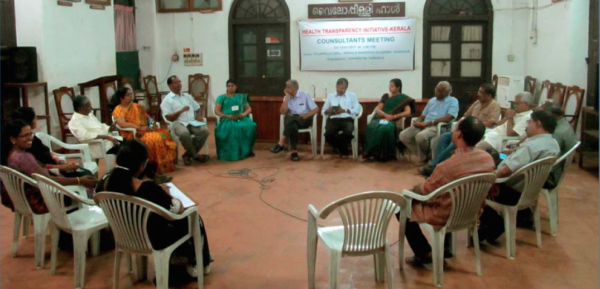
PTF’s Health Transparency Initiative (HTI) provides support to civil society organizations (CSOs) in developing countries to improve health outcomes. Its projects aim to raise citizen engagement with government officials and service providers, thereby controlling corruption, and improving health sector performance. Projects supported under HTI are listed below.

Quality Improvement of Public Health Services in Thrissur, Kerala, India
The HTI’s pilot project was a study undertaken by Indian-based CSO, Jananeethi, intended to help reduce corruption in health service delivery in Thrissur by shining a light on the district’s public health facilities. The study confirmed suspicions that vested interests were undermining public health services to push patients towards higher-cost private clinics they can ill afford. Jananeethi is now implementing a three-year project (2018-2020) to systematically address the shortcomings identified in the report be generating greater citizen engagement in ensuring quality public health services.

MCH has been identified as the top priority in the recently issued Indian National Health Policy. This project is the first phase (2019-2020) of a longer-term program to be implemented by the Indian CSO Youth For Social Development (YSD) and co-financed by the India Development Relief Fund (IDRF). The project objectives are to: enable beneficiaries to constructively engage with authorities and demand improved access, better quality of MCH services and hold them accountable; improve access to and quality of MCH through the use of community score card process and other social accountability tools; and collaborate with researchers to contribute to evidence on improving outcomes under SDGs-3 (health), SDG-5 (Gender) and SDG-16 (governance) through citizen engagement.

Health Transparency Initiative for Uganda (HTI-Uganda)
The first HTI-supported project in Africa, approved in November 2019, aims to influence reforms that improve public health services in Kasangati, Uganda. The project will apply social accountability approaches with the aim of producing a robust collection of data-points on the efficiency, quality and availability of public health services as well as influencing contextual factors. This information will then be triangulated with mechanisms for change surrounding the management of public health services to produce data on the effectiveness of interventions. The initial year-long project will monitor the operations of Kasangati Health Center IV, serving approximately 100,000 citizens, to test the impact and overall viability for national-level coverage. It will be implemented by the Anti Corruption Coalition Uganda (ACCU) with support from the Kasangati Rotary Club.

